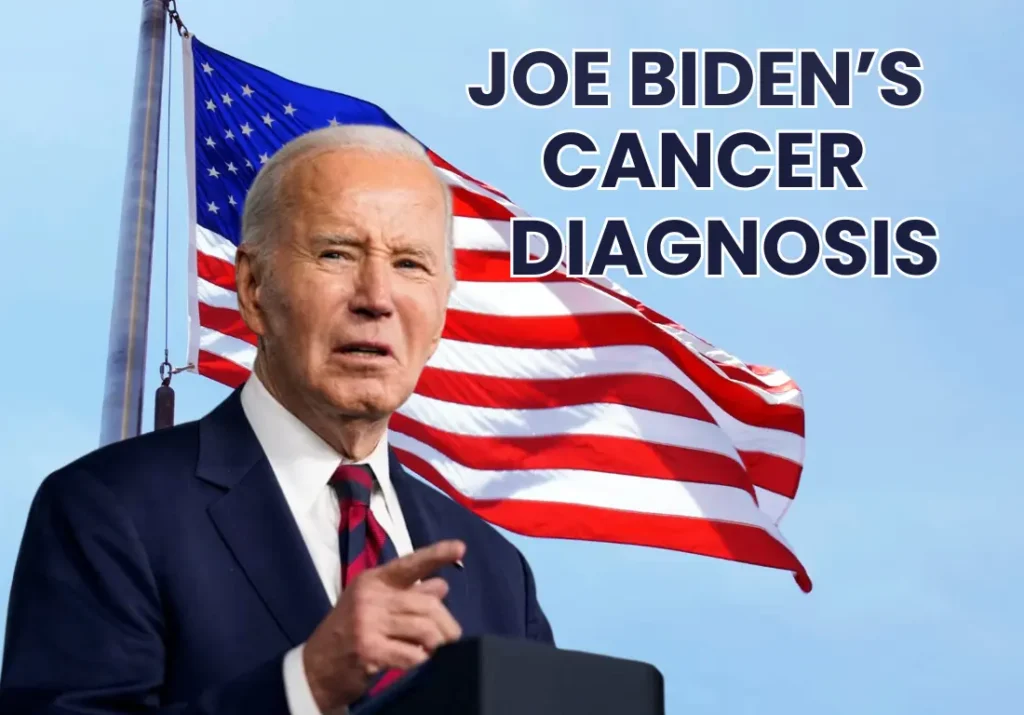In a surprising turn of events that has struck a chord across the nation, Joe Biden’s cancer diagnosis—confirmed as aggressive prostate cancer—has sparked deep concern and reflection. Known for his resilience and unwavering leadership, the President now faces a personal health battle that may have lasting implications for his presidency. As the leader of the free world steps into this new chapter, many are left asking what this means for his health, his ability to lead, and the future of cancer care in America. With healthcare and research being central to his administration, this diagnosis brings those issues closer to home.
Here’s what Joe Biden’s prostate cancer diagnosis could mean for his legacy, leadership, and the path forward.

Understanding the Joe Biden’s Cancer Diagnosis
President Biden has always been transparent about his health, and this latest revelation showcases his deep-rooted belief in honesty and openness. The news of his cancer diagnosis has prompted a wave of support from citizens and leaders worldwide. It raises essential questions about the 80-year-old’s health strategy moving forward and how it might impact his ability to lead.
The Type of Cancer
President Biden has been diagnosed with aggressive prostate cancer, a condition that affects 1 in 8 men during their lifetime and is most common in those over the age of 65. While the White House has not disclosed the precise stage or Gleason score, early reporting confirms it was detected through routine screening—underscoring the importance of regular check-ups.
Medical experts emphasize that prostate cancer, especially when caught early, often responds well to treatment. However, more aggressive forms can spread beyond the prostate, requiring comprehensive management. This moment puts a national spotlight on men’s health, cancer awareness, and the vital role of early detection in improving survival outcomes.
Medical Plans and Treatment
While the public awaits updates, the President’s healthcare team is likely crafting a comprehensive treatment strategy tailored to his specific condition and needs. Historically, advancements in cancer treatments have provided a promising outlook, with numerous options available depending on the cancer’s nature and stage.
Impact on Presidency
President Biden’s recent health setback naturally stirs conversations regarding its potential impact on his role as President. Though he faces a significant personal challenge, it’s crucial to recognize the well-established structures in place within the U.S. government that ensure continuity regardless of any individual’s circumstances.
Leadership and Delegation
The President has a robust team capable of taking charge as needed. From the Vice President to the cabinet members, each plays a role in maintaining the country’s functions smoothly. In line with the U.S. Constitution, any transitions in responsibilities are clear-cut to uphold governance effectively.
Health Policy and Advocacy
Having emphasized healthcare reform throughout his presidency, President Biden’s diagnosis casts a spotlight on the urgency of these issues. It’s plausible to assume that this personal experience might intensify his resolve to improve cancer treatment accessibility and increase funding for research and development.
Public Reaction and Support
As news of the diagnosis spread, it was met with an outpouring of empathy and solidarity from all corners. Political allies, opponents, and citizens came together in a moment that transcends political divisions. The President’s journey is now intertwined with the symbolic battle against a disease that affects millions globally.
Nation’s Resilience
In moments like these, the story of a leader battling an illness becomes a shared narrative, inspiring the nation to rally for progress in medical research and compassion for those affected. This collective support not only fortifies the President’s resolve but highlights a unified call to action in the fight against cancer.
The Road Ahead
While the path forward is uncertain, history has shown that President Biden is no stranger to adversity. His life, marked by triumphs and tragedies, has always been defined by perseverance and strength. These traits, coupled with the support of the nation, suggest that he will approach this battle with the same determination.
Conclusion
Joe Biden’s battle with cancer is a poignant reminder of the vulnerabilities we all share. It sheds light on the resilience required to confront such challenges head-on. As he faces this journey, the nation stands behind him, united in hope and the pursuit of a future where fewer families face the scourge of cancer.
Undeniably, the diagnosis brings to the forefront the critical importance of healthcare, early diagnosis, and innovative treatment solutions. As President Biden navigates this journey, his steadfast leadership and commitment to health advocacy continue to pave the way for impactful, life-saving change.
FAQs
What type of cancer was Joe Biden diagnosed with?
President Joe Biden was diagnosed with aggressive prostate cancer, which is common among older men. It was reportedly detected during routine screening.
How serious is prostate cancer at Joe Biden’s age?
Prostate cancer becomes more concerning with age. Aggressive types can spread, but early treatment often leads to good outcomes—even for men over 80.
What is the Gleason score in prostate cancer?
The Gleason score helps doctors measure how aggressive prostate cancer is. A higher score means the cancer is more likely to grow and spread quickly.
Is prostate cancer treatable in older adults?
Yes. Many older adults successfully manage prostate cancer with treatments like radiation, surgery, or hormone therapy—especially when caught early.
What are the symptoms of aggressive prostate cancer?
Symptoms may include difficulty urinating, pelvic pain, blood in the urine, or fatigue. However, many men experience no symptoms in the early stages.
Has Joe Biden spoken about his prostate cancer diagnosis?
So far, President Biden has not made a detailed public statement, but the White House confirmed the diagnosis and is releasing health updates.
What does Biden’s diagnosis mean for cancer research funding?
Biden’s diagnosis may increase attention on cancer care. He’s long supported healthcare reform, and this experience could drive more research investment.
How common is prostate cancer in the United States?
Prostate cancer is the second most common cancer in U.S. men. About 1 in 8 men will be diagnosed during their lifetime, according to the CDC.

